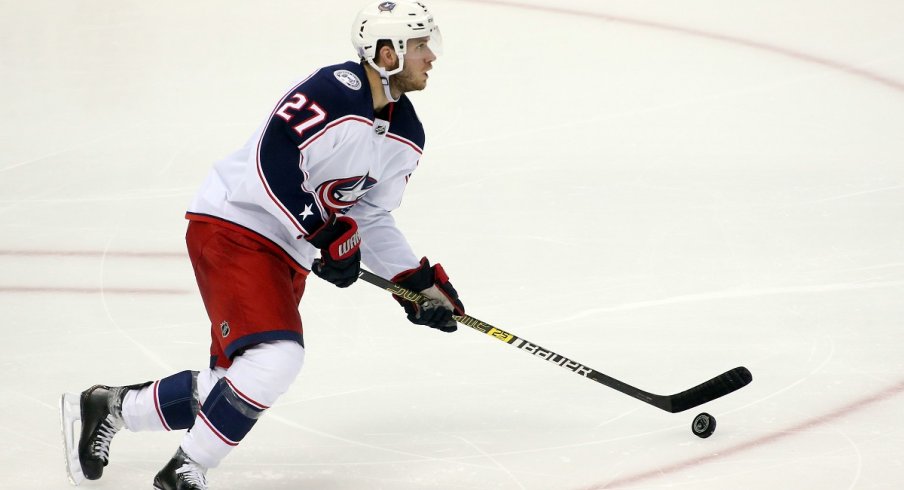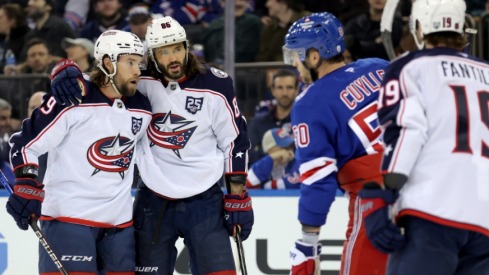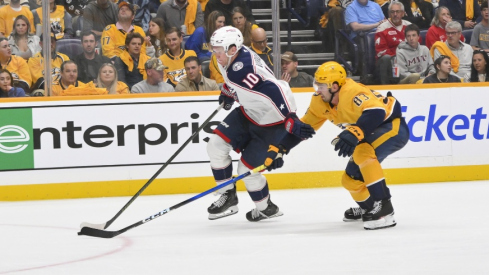To say Ryan Murray is a complicated player would be underselling it.
The Blue Jackets defensemen, a former No. 2 overall pick who is a quality, perhaps even excellent NHL defenseman has – fairly or not – a reputation for being oft-injured. He did not help his case in 2018-19, as an undisclosed upper-body injury sustained on Feb. 18 kept him from returning for the stretch drive and the playoffs.
He finished the season playing just 56 games, though he may have been able to return for the third round of the playoffs.
Markus Nutivaara was dealing with a muscle tear, per Jarmo. He was still a few weeks away. The GM said Ryan Murray was a three-month injury from time of diagnosis in Feb. Said he might have been able to play in next round. Declined to say what injury was. Said to ask the player
— Tom Reed (@treed1919) May 7, 2019
After playing just 44 games in 2017-18, the restricted free agent (RFA) signed a one-year "prove it" qualifying offer in hopes of raising his salary dramatically and ASAP. But a year later, the Blue Jackets (and Murray) find themselves at a similar crossroads.
Murray is again an expiring RFA, and the Blue Jackets the wield negotiating power for the last time. Using the Collective Bargaining Agreement's (CBA) 27-or-7 Benchmark, any player at least 27 years old or who has at least seven years playing in the NHL will be an unrestricted free agent (UFA) at the end of his contract. Murray will be playing his seventh NHL season in 2019-20, which means the upcoming season is his last before reaching UFA status, where he can call his shots.
The Blue Jackets know this and will use their leverage, as they have in the past with other RFAs like Josh Anderson. So the questions at hand are simple: what is Ryan Murray worth? And what will the Blue Jackets and Murray settle on?
Murray, who formed a solid pairing with Seth Jones on the Blue Jackets top pairing for much of the early part of last season, is a steadying presence on the blue line. He doesn't provide a ton of offense but set a career high in points thanks to 28 assists (also a career in high) in 56 games. He isn't flashy but is effective in all facets of the game, and is unquestionably one of the more gifted defensemen in the NHL. The only problem is that he's played just under two thirds (320 of 492 = 65%) of regular season games since he came into the NHL in 2013.
Based on pedigree and skill set alone, he's a $5 million per season player, and that's perhaps being conservative. But to paraphrase former NFL coach Bill Parcells famous quote, "you are what your record says you are," Murray's injury history is what it is. To put it simply, he's a fantastic talent that the Blue Jackets have been, and continue to be, unable to depend on.
Think it's frustrating for fans? Imagine being Murray, who is literally seeing millions of dollars being left on the negotiating table while he's recovering on the athletic trainer's table.
NHL statistics outlet Evolving-Hockey listed Murray tied for 27th among all NHL defensemen in WAR (wins above replacement) in 2018-19 with 1.9 wins, which is especially impressive given he played just 56 games. According to their model, he's tied with Dallas Stars stud John Klingberg and ahead of all Blue Jackets defensemen other than David Savard.
And for those who prefer a more objective measure, Murray's 55.24 5v5 GF% (the ratio of goals he was on the ice for vs. against) ranked 51st in the NHL among defensemen (minimum 500 minutes played), again trailing only Savard (57.02%), per NaturalStatTrick.
A recent poll on this website recommended that the Blue Jackets trade Murray due to a surplus of defensemen, but I believe this is ill-advised. First, the Blue Jackets would not likely receive full market value for him in a trade. And while he's not been healthy for even 2/3 of his career, Murray is too important to this team when he's healthy.
Will it limit his impending contract? Yes. Should they trade him at a discount because of it? No.
In the end, I don't think Murray's representation would agree to a long-term deal at a lower dollar value, as they'll want a kick at the can when their client's value is higher, especially while he's in the prime of his career. At the same time, it would be a surprise for GM Jarmo Kekalainen to sign Murray for another one-year deal that walks him straight to UFA.
Murray's career in some ways mirrors that of Erik Gudbranson, a former No. 3 overall pick who has failed to meet expectations (Note: I'm not at all comparing the two players, just pointing out the inability to fulfill the lofty expectations that come with that draft status). I believe Murray will follow Gudbranson's suit in signing a medium-term contract with a modest salary increase that won't inhibit the club moving forward.
Official prediction: 3 years, $12M ($4M AAV)


